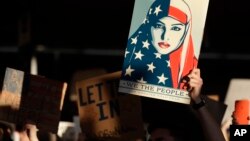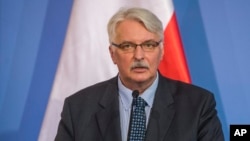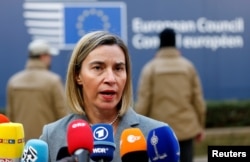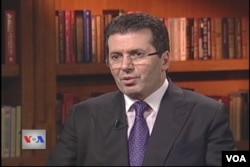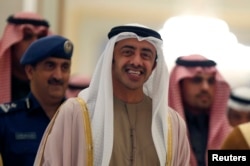The international reaction to temporary immigration restrictions put in place by U.S. President Donald Trump has been largely negative — with several major organizations publicly denouncing the directive — but a few foreign leaders have voiced support for the plan.
Diplomats from several European and Middle Eastern countries have shown support for Trump's order to indefinitely block the settlement of Syrian refugees in the U.S. and temporarily block entry to the U.S. for citizens of seven majority-Muslim nations the federal government has designated as posing an elevated risk of terrorism.
Polish Foreign Minister Witold Waszczykowski defended the Trump executive order in an interview Sunday with Polsat News, saying Trump "was elected president, he has the right" to restrict entry.
Waszczykowski, a member of Poland's conservative government, added, "No state has the duty to accept immigrants."
Restriction on travel
The Trump executive order triggered protests at airports across the country in the days following its signing and received condemnation from leaders in both the European Union and the United Nations.
U.N. High Commissioner for Human Rights Zeid Ra'ad al-Hussein on Monday called the travel ban "mean-spirited" and said it is a waste of counterterrorism resources.
EU Foreign Affairs Representative Federica Mogherini told the European Parliament on Wednesday she "certainly" disagrees with the order.
"As a good friend of the United States ... Europe has a duty to be respectful and clear whenever disagreement arises, especially when it relates to our fundamental values," Mogherini said. "And we certainly disagree with the executive order signed by the president of the United States."
While the international organizations condemned the action, diplomats from member states weren't as uniform in their opposition.
EU criticized
Italian Foreign Minister Angelino Alfano criticized the EU for its own handling of the refugee crisis and said no one should be surprised by Trump's actions "since he had spoken about such things in the election campaign" and won based upon his promises.
"[Europe] is not in a good position to give opinions about the choices of others. Or is it that we want to forget that we, too, erect walls in Europe," Alfano said in an interview with the Italian newspaper Corriere della Sera.
In an interview with VOA, Fatmir Mediu, chairman of the Republican Party of Albania and former defense minister, said he understands the reasoning behind the ban and that security should be the "primary interest" of any U.S. president.
"These days, the process of vetting is necessary," Mediu said. "This has been a long-established fact. The system must filter all those people who want to come in [to the U.S.] and at the same time ban those who have bad intentions and terrorist purposes."
Hungarian Prime Minister Viktor Obran has also expressed support for Trump and has been invited by Trump to visit the White House.
In the Middle East, several leaders have voiced support for the travel restrictions, including the United Arab Emirates' foreign minister, who called it a "sovereign decision" on the part of America and dismissed claims that it is targeted at Muslims.
"There are attempts to give the impression that this decision is directed against a particular religion, but what proves this talk to be incorrect first is what the U.S. administration itself says ... that this decision is not directed at a certain religion," Abdullah bin Zayed al-Nahyan told reporters Wednesday.
The executive order targets seven majority-Muslim countries, leading some to criticize it as unjustly targeting Muslims.
Terrorism concerns
The Trump administration has refuted these claims, however, on the basis that the seven countries were identified by former President Barack Obama's administration as being of particular concern for exporting terrorism.
Dhahi Khalfan, head of security in Dubai, also voiced support for the ban, telling Trump, "What you're doing is right."
"America doesn't have to accept underdeveloped people, they've already taken in many before. Unproductive groups don't deserve to be in America — Iranians or Iraqis or Somalis," he said on Twitter.
Other Gulf Arab countries, which weren't named in the travel ban, have been mostly quiet in the debate over Trump's executive order, though Qatar's foreign minister did express light opposition to the ban while on a recent trip to Serbia.
"When it comes to be addressed in a Muslim framework, I think this is something we will stand against," Sheikh Mohammed bin Abdulrahman bin Jassim Al Thani said.




